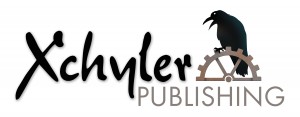Today’s guest post is by Penny Freeman, editor-in-chief at Xchyler Publishing.
 Although Andrew asked me to write a blog post for his site some time ago, the date of publication came and went with me still staring at the monitor, unable to formulate my thoughts—or, at the very least, unable to figure out how to adequately express my thoughts in a way that would communicate my intent. Then, I read an op-ed in the New York Times about university students who are so intent on protecting [insert special interest group of choice here] from any sort of offense or emotional turmoil, they are campaigning to restrict freedom of speech and the actual texts used in courses.
Although Andrew asked me to write a blog post for his site some time ago, the date of publication came and went with me still staring at the monitor, unable to formulate my thoughts—or, at the very least, unable to figure out how to adequately express my thoughts in a way that would communicate my intent. Then, I read an op-ed in the New York Times about university students who are so intent on protecting [insert special interest group of choice here] from any sort of offense or emotional turmoil, they are campaigning to restrict freedom of speech and the actual texts used in courses.
Huckleberry Finn had to go because of the N-word. Guest lecturers must be un-invited from speaking because they used the N-word in discussing the evolution of the N-word and its social acceptability. Euclid could not be taught in humanities classes because it might trigger emotional responses in victims of violent crime. Such persons may not feel safe or sheltered in such discussions, so those discussions must not occur. Anywhere. Ever.
I believe this is where we, as Mormon writers, too often find ourselves, and why the term “Mormon literature” causes some readers to roll their eyes in frustration. We are so intent on sheltering the reader from offensive material, we wrap them up in cotton and set them in a cozy egg carton, safely deposited on a high shelf. The problem: when readers happen upon stories that refuse to admit life rarely comes equipped with bubble wrap and packing peanuts, they find the writing shallow and dissatisfying, with little dimension and no color.
I grew up (as I’m sure did you all), with this old chestnut:
Q: Do you know what this is?
A: A polar bear in a snowstorm.
Because we’re LDS and we want to portray the virtuous, lovely, and of good report and praiseworthy, do we only write white-out blizzards and the camouflaged animals inhabiting arctic regions? Or, to put it in Texan terms, are we terrified of the burn of habanero, so we refuse to use paprika?
Don’t get me wrong. As a book blogger, I received requests from many authors to read and review their books on my website. At the time, I was devouring three or four books a week. I have been approached by those who insisted their work was worth the trauma I would undergo reading it. One particular gentleman attempted to convince me his story about the gritty underbelly of the California prison system was all about redemption, etc., etc., etc. I had no reason to disbelieve him, and he should be commended for his personal successes. However, I know it would be impossible to write about the subject without lacing it heavily with obscenities and profanities, with violence, anger, and verbal and emotional assault. I don’t need that in my life. I took a pass.
Another author sent me a book called The Littlest Angel, a story of a father who cooked and dealt crack and how it affected his five-year-old daughter who underwent severe physical abuse at the hands of her addict mother. I got through about half the book. While his gritty reality proved compelling and well-written, and the work probably deserves more attention than it received, ultimately, it just hurt too much to read, especially as he wrote it in the first-person, from the point of view of the child.
I have turned down books with LGBT agendas, angry feminists with nothing good to say about men, horror, demons, and erotica. I believe some people thought me a Pollyanna. My sons insisted I refused to read any author who hadn’t been dead for at least a hundred years—which is a fair bit of truth. Jane Austen wrote in an era when sexual gratification wasn’t the be-all and end-all of every relationship, and not everyone was irreparably broken. She wrote about love and hope while still acknowledging the unseemly and sometimes downright evil in the world.
Having read Flowers for Algernon and Ordinary People as high school assignments, I decided some things went on in the world in which I didn’t need to immerse myself to be a better person. Another time, my online reading group extolled the virtues of Kurt Vonnegut, so when my son came home with his senior reading list, finding the author on it, I picked up a paperback at my local Barnes & Noble. Imagine my horror when a few days later, he returned it to me, saying, “Mom, I don’t think I should read this.” He refused to tell me why, but just shoved the book at me. As soon as I flipped it open, Vonnegut’s obscene graffiti stared me in the face. You just aren’t assaulted thus with Charles Dickens or James Fennimore Cooper.
Often times, I read offerings from members of the American Night Writers’ Association (ANWA), a group founded to provide LDS women exclusively an uplifting and edifying environment in which to share their work and receive positive criticism—to improve their craft. It is a very worthy organization, one to which I owe a great deal. However, the authors who truly excel are those who eventually abandon those safe confines and interact with writers and readers of both genders and from a multiplicity of belief systems. For some LDS authors, perhaps those warm nursery shoals are the best place to linger. The problem is, following such a tack, a writer never gets anywhere. The best feeding grounds—those places with the most opportunities to grow—are closer to the poles, in cold, rough, and open sea.
ANWA is populated with some especially talented authors, most specifically its founder, Marsha Ward, a prolific writer who wrote the Owen Family Saga (my review of her first book, The Man from Shenandoah) and steadily improves her craft, and Tanya Parker Mills who wrote The Reckoning (my review), which speaks for itself.
I also discovered C. S. Lakin as a blogger, an non-LDS author who also believes “Christian” isn’t equivalent to “cotton-balled.” Her book Intended for Harm (my review) is a modern-day adaptation of the story of Jacob and Joseph, and is anything but sugarcoated. Conundrum (my review), a master work, explores personal growth, resolution of conflict, family dynamics, and finding peace with the past. While ultimately uplifting, Lakin ventures with an unflinching gaze into the darkest reaches of mental illness and its effect on entire families. She evaluates, explores, engages, then allows her protagonist to emerge into a light unlike any she had ever known.
Because Lakin dares to take this journey, because Ward and Parker Mills brave similar unfriendly waters, because all three deftly weave in the narrative their own personal faith, I remember their work. While I’m certain there are flaws, I don’t remember them. Their words, their thoughts, their insight have settled in my heart and spoken to my soul. The others? Ummm . . . give me a minute to go look them up.
As a non-LDS publisher with an LDS majority in both the staff and signed authors, but who also works with authors ranging from atheists to Catholics and everything in between, we have learned the importance of finding ways for authors to express themselves and convey their message but also allow the reader to emerge from the experience feeling uplifted and edified, if not entirely protected from the buffetings of real life. It’s a delicate balance to strike, particularly when dealing with pervasive use of profanity and obscenities, or, on the flip side, with too little dimension and not enough complexity of character. But it is attainable, if sometimes a negotiation. In my experience, both parties come away better writers for the exercise.
Just as “Mormon” should not mean “whitewashed,” we don’t believe “adult” should be the equivalent of “obscene.” Adult should mean intelligent writing, complex themes, engaging characters, engrossing plots, and well-written and relevant prose, even set in imaginary worlds or eras that never were. Adult should mean a work challenging to the intellect, satisfying to the sensibilities, and likely to leave the reader a better person for the experience.
I believe we at Xchyler Publishing have achieved this goal. While some are not appropriate for readers who demand a featureless landscape, we are proud of every book we have produced. None are dependent upon titillation to sell books. Every title offers the reader expanded horizons. It may not be a painless journey, but each leads to a worthwhile destination. We refuse to pander to society’s most base instincts.

Ursus maritimus
Lehi made the point perfectly clear: for light to exist, there must be darkness. With sunshine comes shadow. Like the world in which they inhabit, even polar bears aren’t perfectly white. They have shades of color. The play of light accentuates their features. They even have dirt and stains. They have substance.
When we, as authors, demonstrate our personal acquaintance with pain, when we acknowledge temptation and struggle and failure, when we don’t assume that being LDS gives us a pass for good writing, then we can far better convince our readers there is also hope, faith, compassion, and redemption. As members of the LDS faith, we should be strong proponents of light, but to coax anyone from the darkness, we must reach out and take them by the hand. To do so demands a willingness to acknowledge its existence.
Prominent LDS author Orson Scott Card allows himself the presumption of making real people out of personages we revere: Joseph Smith and Emma Smith, Moses, Aaron, and Miriam, Jacob, Rachel, and Leah, Sarah and Abraham, and Rebecca and Isaac. None of them are perfect, all of them are flawed, all of them find redemption and purpose in their faith in God, and isn’t this for which we all strive?
Card also uses fantasy and science fiction to preach eternal truths. He finds ways for his religion to live in his work, while still embracing those who live outside it. Unless we, as authors, learn to do the same, we’re pretty much preaching to the choir, and most of them are asleep. Perhaps we, as a people, should write as if we believe the world is actually listening.
Penny describes her company as follows. “Founded in 2012, Xchyler Publishing is the speculative fiction imprint of Hamilton Springs Press, a boutique publisher owned and operated by Heidi Birch and Penny Freeman, both members of The Church of Jesus Christ of Latter-day Saints. The X Team strives to provide the public with the quality writing we like to read ourselves: engaging plots, intriguing characters, and finely crafted prose that uplifts and edifies. Our authors, editors, graphic artists and marketers hail from around the world and adhere to a wide rage of belief systems. We celebrate and reinforce our similarities and respect our differences, learn from one another, and strive to make our small corner of the literary world a better place.”


My favorite line from this post: “Just as “Mormon” should not mean “whitewashed,” we don’t believe “adult” should be the equivalent of “obscene.””
It’s tricky sometimes, because (as I think you point out) different people vary in what they find uplifting and in what they find obscene or whitewashed. As writers, readers, and publishers, all we can do is reflect and/or seek out the balance we find speaks meaningfully to us. Though I suppose I would hope that as a reader, I would also give a try to things that push my balance a little when endorsed by other readers whom I respect. I’m certainly glad for those who were willing to give the benefit of the doubt to my own first published novel (No Going Back), despite its subject matter. At the same time, I can’t help but think that things will be easier if my next novel is part of a fantasy series, as currently planned…
The word below is the first answer that popped into my mind when I read the question, “What color is a polar bear?”
Cold.
The answer to the all-white painting when I was younger: A ghost in a snow storm.
I’ve watched the educational system change from basic education to indoctrination. I feel fortunate that my children learned from my mistakes. Both are adults I am quite proud of and I’ve told them on more than one occasion, “You raised yourselves well.” Of course, they insist on giving me some credit. 🙂